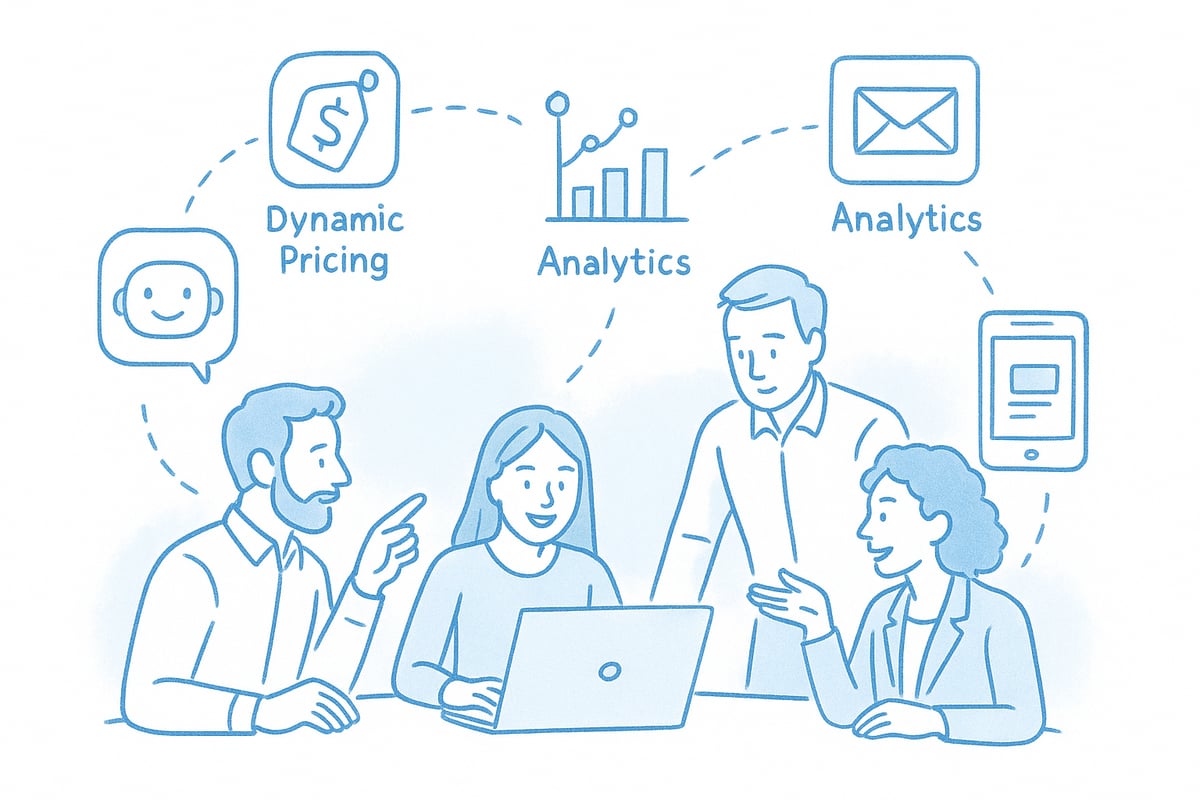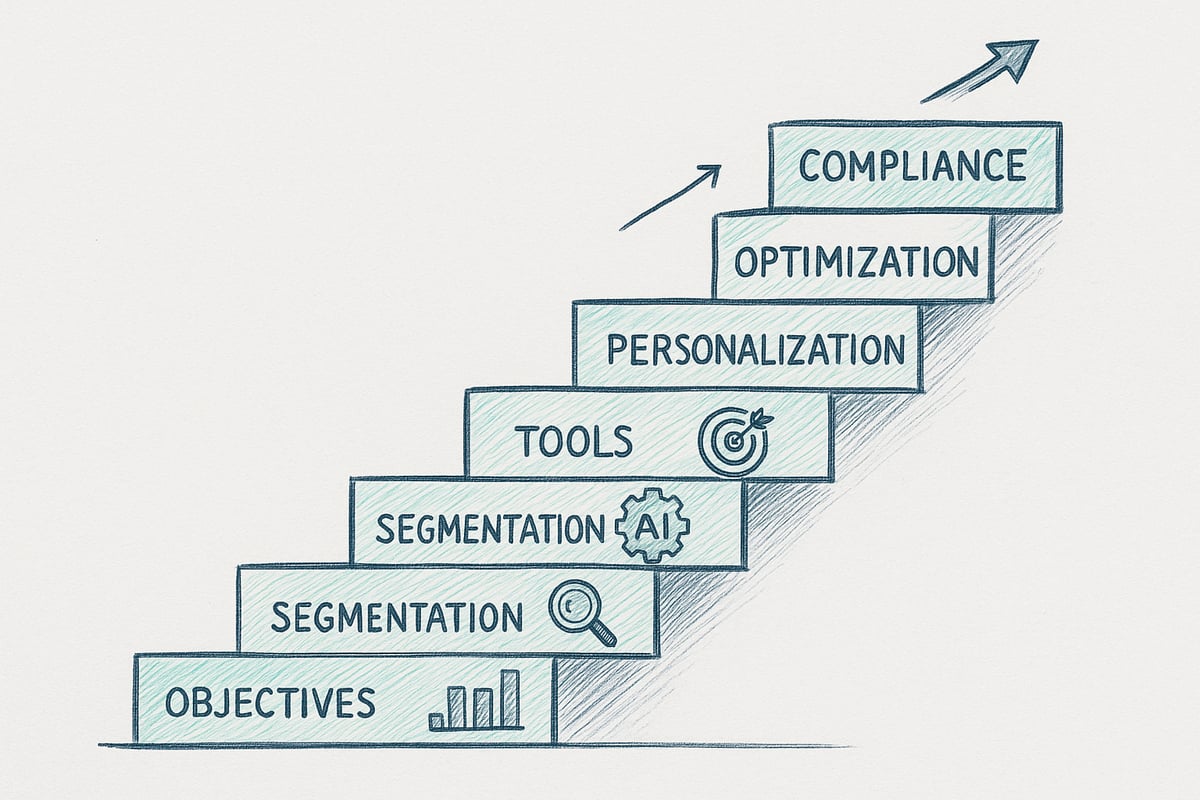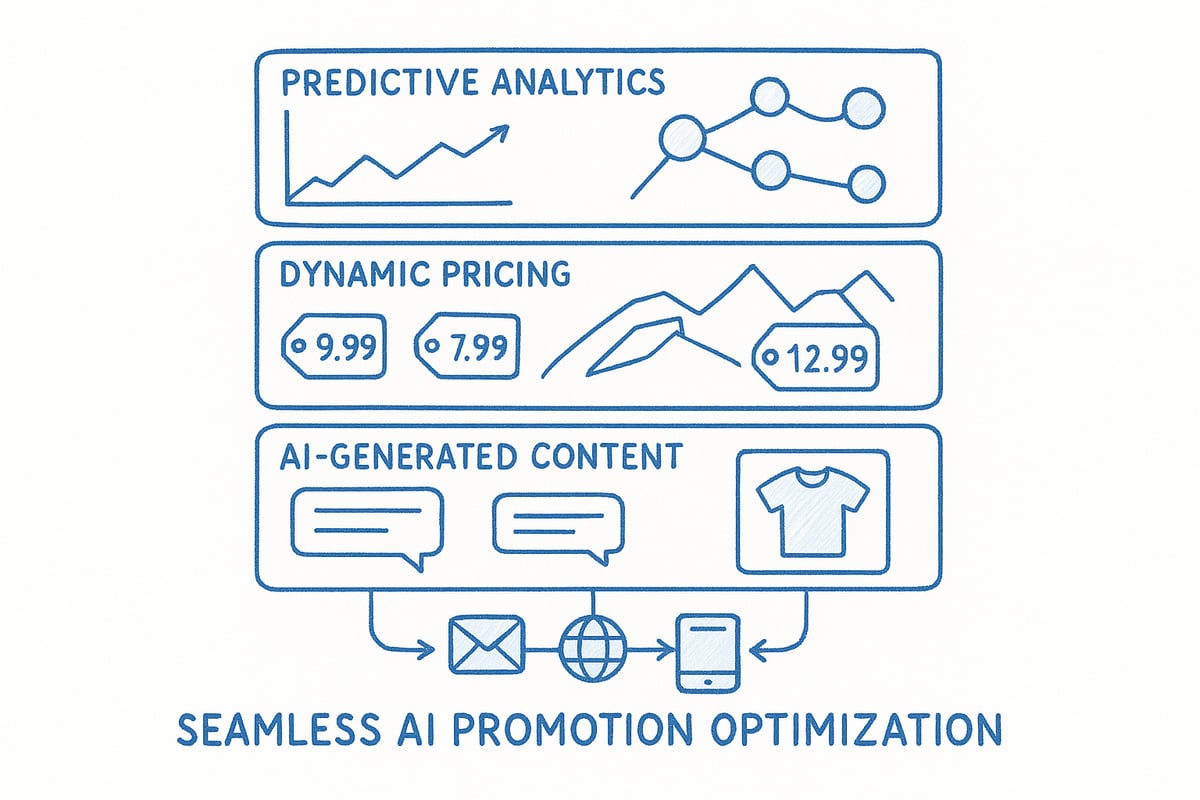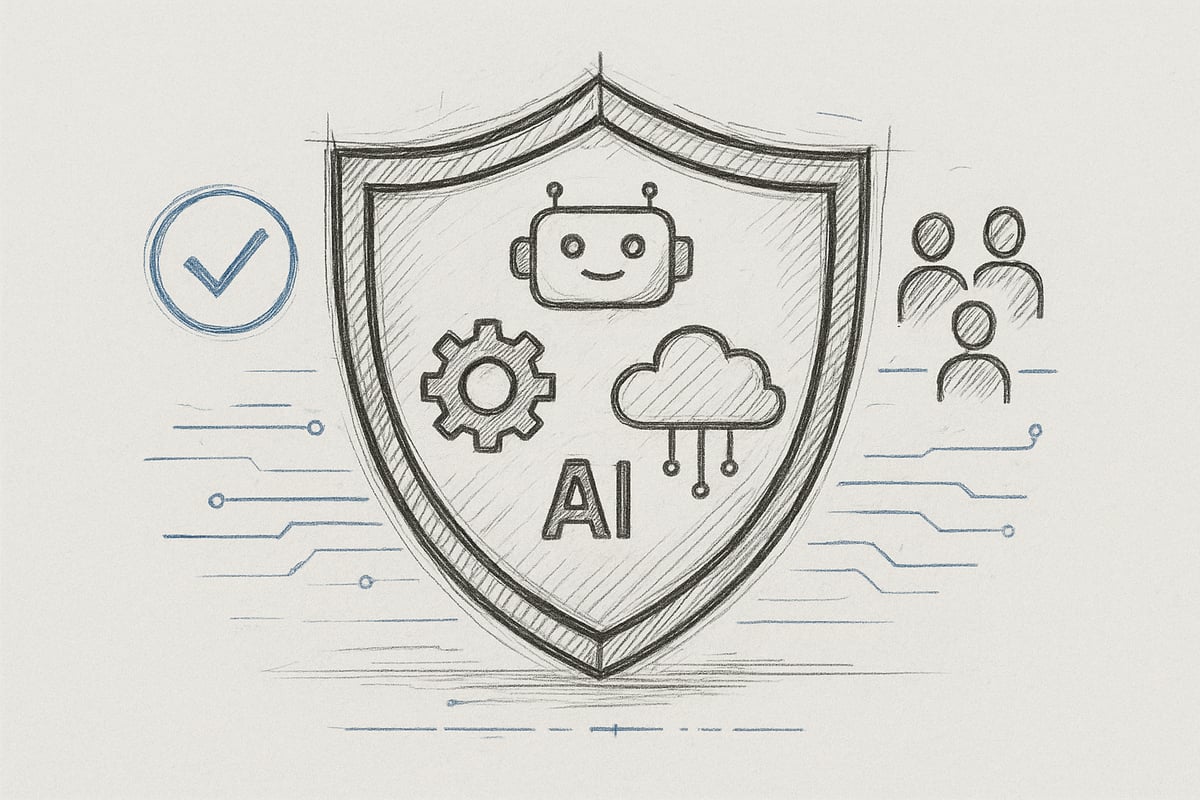AI promotions are revolutionizing digital marketing as we enter 2025, with adoption rates soaring across industries. Businesses leveraging these intelligent campaigns are outpacing competitors and transforming how they connect with customers.
This guide reveals proven strategies to help you harness the full potential of AI promotions. Whether you are a marketer, business owner, or strategist, you will discover the latest tools, methods, and best practices for running successful AI-powered campaigns.
Explore fundamentals, step-by-step planning, optimization tips, ethical considerations, and the trends shaping the future of AI-driven promotions. Get ready to gain a decisive edge in the evolving digital landscape.
Understanding AI Promotions: Fundamentals & Trends
AI promotions are transforming digital marketing by automating and personalizing customer engagement at scale. Unlike traditional campaigns, ai promotions use advanced algorithms to tailor offers, messages, and timing for each user. Examples include AI chatbots guiding shoppers, dynamic pricing engines adjusting costs in real time, and systems that deliver personalized discounts. Adoption is surging, with recent studies showing over 60 percent of enterprises integrating AI-driven solutions into their marketing stack. Core technologies driving this shift include machine learning, natural language processing, and predictive analytics, which together enable smarter, more responsive promotions.
What Are AI Promotions?
At its core, ai promotions refer to the use of artificial intelligence to plan, execute, and optimize marketing campaigns. The scope covers automated offer generation, real-time personalization, and predictive targeting. What sets ai promotions apart from manual approaches is their ability to analyze vast datasets and act instantly on insights. For instance, AI chatbots can answer queries and recommend products 24 7, while dynamic pricing algorithms adjust offers based on demand and user behavior. Market adoption continues to rise as businesses seek greater efficiency. Leading technologies such as machine learning and natural language processing allow marketers to run more impactful campaigns with less manual effort.
Key Benefits of AI Promotions
Implementing ai promotions delivers clear advantages for businesses of all sizes. Enhanced personalization means customers receive relevant offers, boosting engagement and satisfaction. AI enables precise targeting, ensuring campaigns reach the right audience at the right time. Automation streamlines workflows, reducing manual labor and freeing teams to focus on strategy. Improved ROI and conversion rates are common, as AI adapts campaigns in real time for optimal performance. Consider an e-commerce brand that deployed AI recommendation engines and saw a 20 percent increase in sales within months. Real-time decision-making ensures promotions stay relevant, even as market conditions shift.
2025 Trends Shaping AI Promotions
Looking ahead, ai promotions will be defined by several major trends. Generative AI is set to revolutionize content creation, enabling marketers to produce ad copy and visuals tailored to each segment. Integration with omnichannel strategies ensures a seamless customer experience across web, email, and social platforms. Privacy-first AI solutions are gaining traction as regulations evolve, helping brands maintain compliance and trust. Hyperlocal and micro-moment marketing is on the rise, with AI identifying when and where to engage each user. According to Statista, global AI marketing spend is projected to increase by over 25 percent in 2025. For a deeper dive, see AI in digital marketing trends.
Common Challenges & Limitations
Despite the promise of ai promotions, several challenges persist. Data privacy and regulatory compliance, such as GDPR and CCPA, are top concerns for brands collecting user data. Algorithmic bias can skew campaign results, making transparency and regular audits essential. Integrating AI tools with legacy systems is often complex and resource intensive. Budget constraints may limit access for smaller businesses, slowing adoption. For example, many retailers struggle with data silos that prevent effective AI deployment. Overcoming these obstacles requires a strategic approach to data management and ongoing investment in AI training and infrastructure.

Step-by-Step: Building a Winning AI Promotion Strategy
To maximize results with ai promotions, a structured approach is vital. This step-by-step guide walks you through every phase, from goal-setting to compliance, ensuring your campaigns are primed for success in 2025.

Step 1: Define Clear Objectives & KPIs
Every ai promotions campaign starts with well-defined goals. Begin by identifying what you want to achieve, such as increasing sales, generating leads, or boosting customer engagement. Align these objectives with your broader business strategy to ensure consistency and focus.
Set measurable KPIs to track progress. Common metrics include click-through rate (CTR), conversion rate, and customer lifetime value. Use the SMART framework to ensure goals are Specific, Measurable, Achievable, Relevant, and Time-bound. This clarity helps you evaluate the effectiveness of ai promotions and make data-driven decisions.
Step 2: Audience Segmentation & Data Collection
The success of ai promotions hinges on understanding your audience. Leverage AI to segment customers based on behavior, preferences, and demographics. Advanced algorithms can uncover hidden patterns, allowing you to target micro-segments with precision.
Collect high-quality, first-party data to fuel these insights. Cleanse and organize your data regularly for accuracy. Use predictive analytics to build detailed buyer personas. Always prioritize privacy by following best practices for consent and transparent data handling, ensuring your ai promotions are both effective and ethical.
Step 3: Selecting the Right AI Tools & Platforms
Choosing the right technology is critical for ai promotions. Evaluate tools based on features, integration capabilities, scalability, and support. Popular platforms include ChatGPT, Salesforce Einstein, and Adobe Sensei, each offering unique strengths for marketing automation and personalization.
Consider cost, user experience, and how well the tool fits your existing stack. For a detailed comparison, see this guide on AI tools for marketing campaigns. For example, a mid-sized retailer might prioritize seamless email integration and robust analytics when selecting a solution for ai promotions.
Step 4: Designing Personalized Promotion Campaigns
Personalization is at the heart of successful ai promotions. Use AI to craft tailored offers, dynamic content, and engaging messages that resonate with each customer segment. Implement A/B and multivariate testing to optimize creative elements and offers.
Leverage real-time personalization across channels like web, email, and social media. For instance, streaming services have increased retention by recommending content based on individual viewing habits. This targeted approach sets ai promotions apart from traditional campaigns, driving higher engagement.
Step 5: Launch, Monitor, and Optimize
Once your ai promotions are live, set up real-time analytics dashboards to monitor performance. AI-powered systems can automatically adjust campaigns based on live data, optimizing bids, budgets, and creative assets for maximum ROI.
Iterative testing is key. Use continuous improvement loops to refine your approach, adapting quickly to changing market conditions. According to Deloitte, companies leveraging AI optimization report up to 30 percent higher ROI from their promotional activities, highlighting the value of ongoing monitoring.
Step 6: Ensuring Compliance & Ethical Use
Compliance and ethics are non-negotiable in ai promotions. Adhere strictly to data protection regulations such as GDPR and CCPA. Build transparency into your AI models by making decision logic explainable to stakeholders and customers.
Establish internal guidelines for responsible AI use, and consider forming an ethics committee to oversee promotional practices. For example, financial services firms must ensure all ai promotions meet regulatory standards and uphold consumer trust. Prioritizing compliance not only protects your brand but also strengthens long-term customer relationships.
Advanced Techniques for Maximizing AI Promotion ROI
Unlocking the full potential of ai promotions requires a strategic approach and mastery of advanced techniques. By leveraging the latest in predictive analytics, dynamic pricing, content personalization, multichannel automation, and real-time optimization, marketers can achieve superior results and maximize return on investment.

Predictive Analytics & Customer Journey Mapping
Predictive analytics has become a cornerstone of ai promotions. By analyzing historical and real-time data, AI can forecast customer behaviors, preferences, and likely next steps along the buyer journey.
This enables brands to:
- Identify high-value segments
- Map out optimal touchpoints for each stage
- Deliver targeted offers at just the right moment
For example, a retailer using predictive modeling can boost upsell rates by anticipating which products a customer is likely to purchase next. According to Forrester, predictive analytics adoption is steadily increasing, helping marketers achieve greater personalization and efficiency in ai promotions.
Dynamic Pricing & Offer Optimization
Dynamic pricing is transforming how businesses approach ai promotions. AI algorithms can adjust prices in real time based on user behavior, demand, and external factors like competitor pricing.
Key benefits include:
- Maximizing revenue by capturing willingness to pay
- Personalizing discounts for different customer segments
- Adapting to market changes instantly
Airlines, for instance, use AI to update ticket prices dynamically, ensuring competitive positioning. However, marketers must balance price optimization with customer trust, as perceived unfairness can lead to backlash in ai promotions.
AI-Powered Content Creation & Personalization
Generative AI is revolutionizing content for ai promotions, making it possible to create tailored ad copy, product descriptions, and visuals at scale. These tools adapt messaging to suit different segments, channels, and even micro-moments.
Benefits include:
- Higher click-through rates from personalized content
- Faster campaign launches with automated production
- Consistent messaging across large inventories
E-commerce brands report significant boosts in engagement and conversions using AI-generated product descriptions. Still, maintaining brand voice and quality control remains a top priority for successful ai promotions.
Multichannel Integration & Automation
Effective ai promotions depend on seamless integration across channels like email, social, SMS, and web. AI-driven workflow automation synchronizes campaigns, ensuring customers receive the right message at the right time.
- Automates repetitive tasks for efficiency
- Triggers personalized responses across touchpoints
- Improves engagement through coordinated outreach
Many organizations are streamlining processes with marketing automation with AI, enabling them to orchestrate complex promotional strategies with ease. Multichannel campaigns powered by AI deliver up to 250 percent higher purchase rates, making this a must-have tactic for modern marketers.
Real-Time Performance Tracking & Optimization
Real-time monitoring is essential for optimizing ai promotions. AI-powered dashboards provide instant insights into campaign performance, allowing for:
- Automated bid and budget adjustments
- Immediate identification of underperforming assets
- Continuous improvement through data-driven decisions
A digital agency using AI to optimize ad spend can quickly shift resources to top-performing channels, improving ROAS and reducing customer acquisition costs. Tracking key metrics such as ROAS, CPA, and retention ensures that ai promotions deliver measurable and sustainable results.
Ethical, Legal, and Privacy Considerations in AI Promotions
As ai promotions rapidly evolve, ethical, legal, and privacy concerns are now central to digital marketing success. Marketers must proactively address these issues to build trust and maintain compliance. The following subsections outline key areas every organization should prioritize when implementing ai promotions.

Navigating Data Privacy Regulations
Data privacy is foundational for ai promotions, especially with evolving global regulations. The General Data Protection Regulation (GDPR) and California Consumer Privacy Act (CCPA) set the standard for how marketers collect, process, and store personal data. In 2025, new regulations are emerging, requiring even more rigorous consent and transparency.
To ensure ai promotions remain compliant:
- Obtain clear user consent before data collection.
- Store and process data securely, with regular audits.
- Provide users with easy opt-out mechanisms.
For example, EU-based companies often adapt ai promotions to meet local compliance standards, minimizing risk. Non-compliance can result in significant fines and reputational damage. For a deeper dive into compliant AI solutions, see Artificial intelligence marketing solutions, which covers best practices for privacy-first campaigns.
Addressing Algorithmic Bias and Fairness
Algorithmic bias is a critical challenge in ai promotions. Bias can arise from unrepresentative training data or flawed model design, leading to unfair targeting or discrimination. Marketers must detect and mitigate these risks to ensure fairness.
Key strategies include:
- Regularly auditing AI models for biased outcomes.
- Using diverse and representative datasets during training.
- Setting up processes for ongoing bias detection.
A notable example involves a social platform revising its ai promotions delivery to prevent discriminatory ad placements. Prioritizing fairness not only reduces legal exposure but also strengthens brand reputation. Addressing bias is essential for trustworthy ai promotions in every sector.
Building Transparency and Consumer Trust
Transparency is vital for building trust in ai promotions. Customers increasingly demand clear explanations of how AI influences offers and recommendations. Brands that provide transparency gain a competitive advantage.
Important practices include:
- Explaining how AI-driven decisions impact promotions.
- Offering straightforward opt-in and opt-out options.
- Disclosing which data is used for personalization.
For instance, a retailer that allows customers to adjust their AI personalization settings enhances user control and engagement. Transparent ai promotions foster loyalty and minimize skepticism, especially as consumer expectations rise.
Developing Internal AI Ethics Guidelines
Organizations must establish internal ethics guidelines to guide the responsible use of ai promotions. Cross-functional ethics committees can oversee the creation and enforcement of these standards.
Key actions involve:
- Publishing an AI ethics charter outlining core values.
- Providing employee training on ethical AI practices.
- Communicating guidelines to all stakeholders.
A leading tech company recently published its AI ethics charter, setting a benchmark for responsible ai promotions. Embedding ethics into company culture ensures long-term compliance and sustainable marketing growth.
Measuring Success: Analytics, Reporting & Continuous Improvement
Continuous measurement is the backbone of successful ai promotions. With evolving analytics capabilities, marketers can track, refine, and elevate every campaign. Let us explore the essential steps for measuring and optimizing the impact of ai promotions.
Key Metrics for AI Promotions
Identifying the right metrics is critical for measuring ai promotions. Focus on core performance indicators such as click-through rate (CTR), conversion rate, return on ad spend (ROAS), and customer retention. These metrics provide a clear view of campaign effectiveness.
A table can help summarize essential metrics:
| Metric | Description | Why It Matters |
|---|---|---|
| CTR | % of users clicking on promotion | Gauges engagement |
| Conversion Rate | % of users completing desired action | Measures campaign success |
| ROAS | Revenue per dollar spent | Assesses profitability |
| Retention | Repeat customers rate | Shows long-term impact |
By benchmarking these indicators, brands can compare current results to industry standards. According to AI Marketing Trends in 2025, data-driven decision-making will become even more vital as ai promotions become mainstream.
Attribution Modeling & ROI Analysis
Understanding which channels drive results is crucial in ai promotions. Attribution modeling, powered by AI, helps marketers analyze customer touchpoints and assign value to each interaction.
Multi-touch attribution models reveal the incremental impact of ai promotions across the buyer journey. For example, a retailer can use AI to identify which channels—like email or social media—most influence conversions.
ROI analysis goes hand in hand with attribution. By evaluating the true return generated by ai promotions, businesses can reallocate resources for maximum efficiency. Regular review of attribution reports enables agile adjustments and smarter budget planning.
Tools for Monitoring and Reporting
Modern analytics platforms with AI capabilities simplify tracking and reporting for ai promotions. Leading tools include Google Analytics, HubSpot, and custom dashboards that integrate with marketing automation systems.
These platforms offer real-time insights, customizable reports, and predictive analytics. Features like automated alerts help teams respond quickly to performance shifts. For agencies, automating client reporting saves time and ensures transparency.
Consider creating a custom dashboard that aggregates data from multiple sources. This approach ensures that all key metrics for ai promotions are visible at a glance, supporting informed decision-making.
Iterative Testing and Campaign Optimization
Continuous improvement is at the heart of ai promotions. Implementing A/B or multivariate testing allows marketers to identify the most effective creative, offers, or channels.
AI tools can automate much of this process, running tests, analyzing results, and suggesting optimizations. Iterative feedback loops mean every campaign becomes smarter over time.
For example, an e-commerce store may increase conversions by regularly testing new messaging and refining segments. By embracing ongoing experimentation, brands ensure that ai promotions deliver sustained growth.
Learning from Failure: Case Studies and Lessons
Not every ai promotions campaign will succeed on the first attempt. Analyzing underperforming campaigns provides valuable lessons. Look for common pitfalls such as unclear objectives, poor data quality, or misaligned targeting.
Case studies show that brands who adapt quickly, pivot strategies, and apply learnings from failures outperform the competition. Agile adaptation is essential in the rapidly changing landscape of ai promotions.
Encourage a culture of learning within your team. Document insights from both wins and setbacks, and use them to inform future planning. This approach ensures continuous improvement and long-term success.
Future Outlook: What’s Next for AI Promotions?
The future of ai promotions is unfolding rapidly, with new technologies, changing consumer expectations, and evolving business needs shaping the landscape. As we look ahead to 2025 and beyond, understanding these shifts is essential for staying ahead of the curve.
Emerging Technologies Shaping AI Promotions
Emerging technologies are driving the next phase of ai promotions. Voice search and visual search powered by AI are becoming more prominent, enabling brands to reach users through conversational and image-based interfaces. Augmented reality and virtual reality, when combined with AI, allow for immersive promotional experiences like virtual try-ons in fashion retail.
For example, a fashion retailer might use AI-driven AR to let customers visualize outfits before buying. According to AI in 2025: Five Trends for Marketing, generative AI and immersive tech are set to redefine how brands engage audiences. These advancements will make ai promotions more interactive and effective than ever.
The Role of Generative AI in Creative Strategy
Generative AI is transforming creative processes within ai promotions. Brands are using AI to brainstorm ideas, develop engaging content, and automate creative production. Human-AI collaboration is becoming standard, with marketers using AI tools to co-create campaign assets, from ad copy to video.
However, challenges remain. Issues like maintaining originality, ensuring copyright compliance, and retaining creative oversight are top concerns. As generative AI becomes more sophisticated, marketers must balance automation with human creativity to ensure that ai promotions remain authentic and impactful.
Evolving Consumer Expectations and Behavior
Consumers are demanding more personalized, relevant, and privacy-conscious ai promotions. Hyper-personalization is now expected, but there is also growing “AI fatigue,” as some audiences become wary of overly automated messages. Transparency and respect for user data are critical to building trust.
Recent surveys reveal mixed feelings: while many appreciate the convenience of AI-driven offers, others express skepticism about privacy. Marketers can address these concerns by offering clear opt-in options and prioritizing ethical data use, as highlighted in 5 AI Marketing Trends to Watch in 2025. Meeting these expectations will be vital for sustained engagement.
Preparing for the Next Wave: Skills & Organizational Change
To capitalize on the future of ai promotions, organizations must invest in upskilling their teams. Key areas include AI literacy, data analysis, and ethical marketing practices. Shifting to a data-driven culture enables faster adaptation to new AI tools and strategies.
- Offer regular AI training programs
- Foster cross-functional collaboration
- Encourage agile approaches to campaign management
By future-proofing business models and building internal expertise, companies can ensure they are ready for the ongoing evolution of ai promotions.
